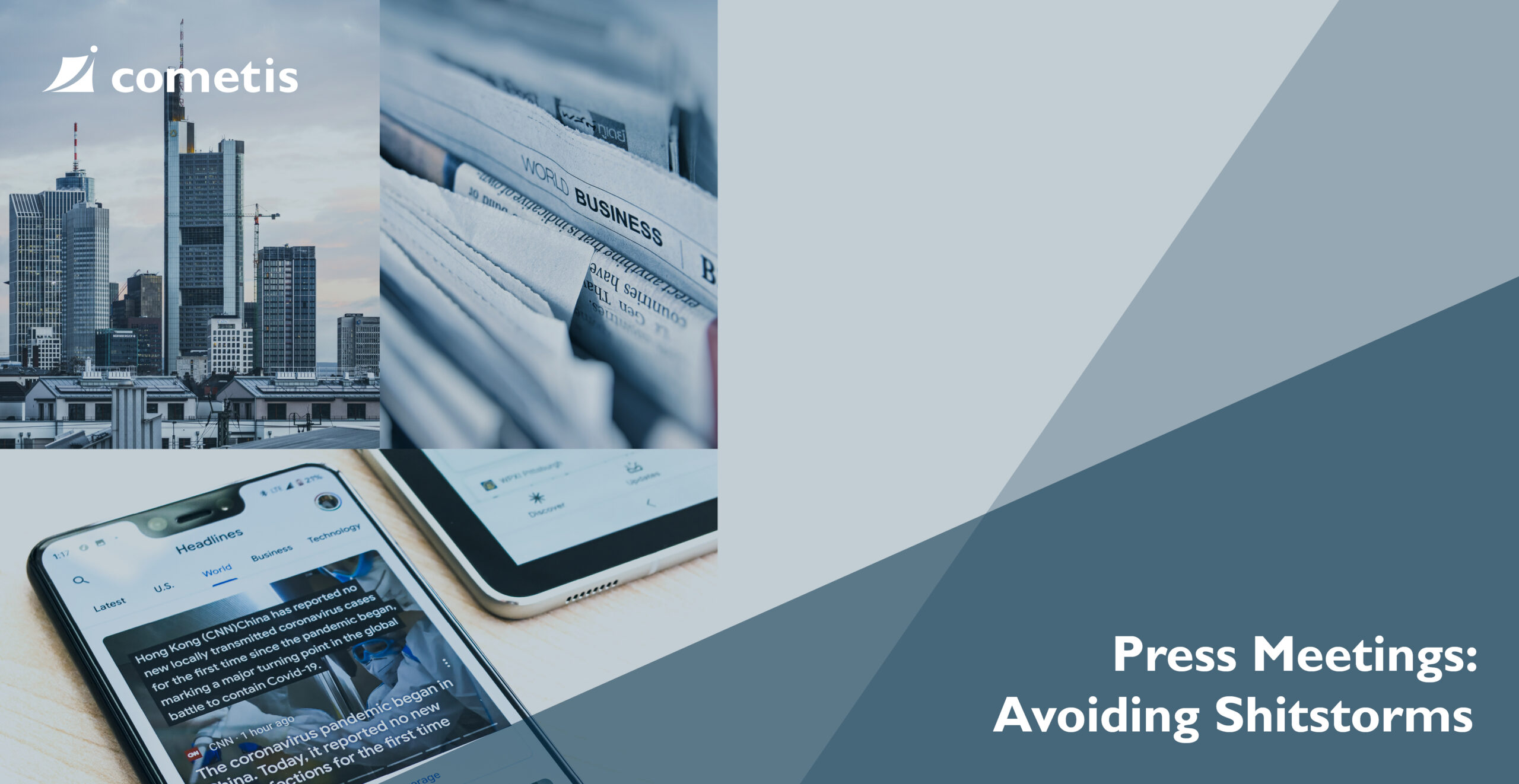A scandal can seriously damage a company’s reputation and develop into a long-lasting crisis. Fast and well-organized action is very important in such a case, because faulty crisis communication can have fatal consequences. With the following four tips, you should be well prepared for an emergency.
Wiesbaden, August 06, 2021. In times of crisis, it is particularly important to communicate precisely -challenging questions from journalists are now pre-programmed. Since journalistic concerns make for good or bad press, you need to handle them professionally. Otherwise, rumors can start flying and fuel additional uncertainties. From a journalistic point of view, however, the following applies: Bad news are good news. Readers prefer to read bad news. In the event of a crisis, it is important to minimize the damage to the company. For this reason, you should put out potential fires while they are still small:
1. Prepare early: Create a communicative emergency plan
First and foremost, companies should outline possible worst-case scenarios while the weather is still fair. Depending on the business, different factors can trigger a crisis. In industry, these are typically risks in the production process. In the case of service providers, the focus is more on susceptibility to fraud on the part of employees. Companies should act pragmatically and not overload the manual with German thoroughness for all eventualities. Crises cannot be fully anticipated, otherwise they would not exist. Nevertheless, a well-structured emergency plan should include a stable framework for crisis communication. To this end, you should designate a management team for potential crises in advance. In addition to the board of directors, this would classically include the human resources manager, the person responsible for finance, and the head of corporate communications. Depending on the type of crisis, you should also involve the management of the relevant problem area. You must then appoint a communications officer and deputy. We would also be happy to assist you with prevention and the correct course of action.
2. In the event of a crisis: Communicate honestly, quickly and concisely
If an emergency really does occur, the crisis team must agree on a concise language regime as quickly as possible – and update it continuously as new information comes to light. The key here is to communicate in a factual yet empathetic manner. Companies should not hide behind technical terms that are incomprehensible to non-professionals. After all, media representatives from outside the field in particular need to understand the messages immediately. You should avoid empty words or empty promises. Tell the public all the facts truthfully, without speculating or making empty promises.
As a general rule, no comment is a bad comment. However, sometimes hitting the “no comment” button is unavoidable. This is typically the case with legally contentious issues or labor issues. However, you should deny grossly false claims made by the press.
Even with unpleasant aspects, you should always stick to the truth. Companies often want to signal to the outside world that they have “everything under control.” But if the problem persists or even worsens, such hasty appeasement quickly falls flat on its face. Then trust is gambled away. It is precisely in critical phases that a company must prove its credibility. In doing so, you should give the media as little room for speculation as possible. For example, if respiratory-damaging gases are leaking from a production plant, the company should tell the truth. If, however, a rumor is falsely spread that highly toxic dioxins have leaked out, you must deny the false report as quickly as possible.
3. Dealing with journalists: Minimize risks and take opportunities
Some journalists bring a negative attitude with them. However, you should not refuse to talk to them. It may even be possible to win over some critical media representatives through credible crisis communication at eye level. Critical journalists use teasing questions to tease out inconsiderate statements. Then convince them with good explanations.
Ideally, the company has the opportunity to talk to journalists it knows. If you are known as a trustworthy interlocutor, you have the best chance of convincing in a crisis. Fair reporting is more likely on an established basis of trust.
4. Media response analysis: using an early warning system
In principle, every company should keep an eye on its media response. A sure instinct is required here. This is especially true in social media. You don’t have to jump on every confused expression of opinion in the social media. But if a false report with “shitstorm potential” becomes apparent, you need to act fast.
Rapid communication coupled with honesty and objectivity helps to prevent bad news from degenerating into a long-lasting scandal. Good preparation is the be-all and end-all. Concise language ensures that the crisis team has the upper hand in the press briefing.
Want to learn more about how we can help you master your crisis communications? Learn more here.

Daniela Simonsen has experience from working on various investor relations and corporate communications projects as well as many years of journalistic work for daily newspapers and ZDF documentaries. In addition, she has several years of experience in customer service and sales.


